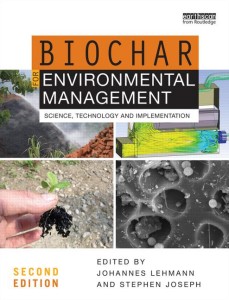1. Biochar for Environmental Management: An Introduction
Johannes Lehmann and Stephen Joseph
2. Traditional Use of Biochar
Katja Wiedner and Bruno Glaser
3. Fundamentals of Biochar Production
Robert Brown, Bernardo del Campo, Akwasi A. Boateng, Manuel Garcia-Perez and Ondřej Mašek
4. Biochar Production Technology
Akwasi A. Boateng, Manuel Garcia-Perez, Ondřej Mašek, Robert Brown and Bernardo del Campo
5. Characteristics of Biochar: Physical and Structural Properties
Chee H. Chia, Adriana Downie and Paul Munroe
6. Characteristics of Biochar: Macro-molecular Properties
Markus Kleber, William Hockaday and Peter S. Nico
7. Biochar Elemental Composition and Factors Influencing Nutrient Retention
James A. Ippolito, Kurt A. Spokas, Jeffrey. M. Novak, Rick. D. Lentz and Keri B. Cantrell
8. A Biochar Classification System and Associated Test Methods
Marta Camps-Arbestain, James E. Amonette, Balwant Singh, Tao Wang and Hans Peter Schmidt
9. Evolution of Biochar Properties in Soil
Joseph J. Pignatello, Minori Uchimiya, Samuel Abiven and Michael W.I. Schmidt
10. Persistence of Biochar in Soil
Johannes Lehmann, Samuel Abiven, Markus Kleber, Genxing Pan, BP Singh, Saran Sohi and Andy Zimmerman
11. Movement of Biochar in the Environment
Cornelia Rumpel, Jens Leifeld, Cristina Santin and Stefan Doerr
12. Biochar Effects on Crop Yield
Simon Jeffery, Diego Abalos, Kurt Spokas and Frank G.A. Verheijen
13. Biochar Effects on the Abundance, Activity and Diversity of the Soil Biota
Janice E. Thies, Matthias C. Rillig and Ellen R. Graber
14. Biochar Effects on Plant Ecophysiology
Claudia Kammann and Ellen Graber
15. Biochar Effects on Soil Nutrient Transformations
Thomas H. DeLuca, Michael J.Gundale, M. Derek MacKenzie and Davey L. Jones
16. Priming Effects in Biochar-amended Soils: Implications of Biochar-soil Organic Matter Interactions for Carbon Storage
Thea Whitman, Bhupinder Pal Singh and Andrew Zimmerman
17. Biochar Effects on Nitrous Oxide and Methane Emissions from Soil
Lukas Van Zwieten, Claudia Kammann, MariaLuz Cayuela, Bhupinder Pal Singh, Stephen Joseph, Stephen Kimber, Scott Donne, Tim Clough and Kurt Spokas
18. Biochar Effects on Nutrient Leaching
David Laird and Natalia Rogovska
19. Biochar Effects on Soil Hydrology
Caroline A. Masiello, Brandon Dugan, Catherine E. Brewer, Kurt Spokas, Jeffrey M. Novak, Zuolin Liu and Giovambattista Sorrenti
20. Biochar and Heavy Metals
Luke Beesley, Eduardo Moreno, Guido Fellet, Leonidas Carrijo and Tom Sizmur
21. Polycyclic Aromatic Hydrocarbons and Polychlorinated Aromatic Compounds in Biochar
Thomas D. Bucheli, Isabel Hilber and Hans-Peter Schmidt
22. Sorption and Remediation of Organic Compounds in Soils and Sediments by (Activated) Biochar
Sarah E. Hale, Gerard Cornelissen and David Werner
23. Biochar and Retention/Efficacy of Pesticides
Ellen R. Graber and Rai Kookana
24. Test Procedures for Biochar Analysis in Soils
Michael Bird
25. Biochar as an Additive to Compost and Growing Media
Christoph Steiner, Miguel A. Sánchez-Monedero and Claudia Kammann
26. Biochar Systems and System Fit
Saran Sohi, John McDonagh, Jeff Novak, Weixiang Wu and Luciana-Maria Miu
27. Biochar, Carbon Accounting and Climate Change
Annette Cowie, Dominic Woolf, John Gaunt, Miguel Brandão and Ruy Anaya de la Rosa
28. Biochar Sustainability and Certification
Frank G.A. Verheijen, Ana Catarina Bastos, Hans Peter Schmidt, Miguel Brandão and Simon Jeffery
29. Economic Evaluation of Biochar Systems: Current Evidence and Challenges
Simon Shackley, Abbie Clare, Stephen Joseph, Bruce McCarl and Hans-Peter Schmidt
30. Socio-economic Feasibility, Implementation and Evaluation of Small Scale Biochar Projects
Stephen Joseph, Mai Lan Anh, Abbie Clare and Simon Shackley
31. Commercialization of the Biochar Industry
Michael Sesko, David Shearer and Gregory Stangl





